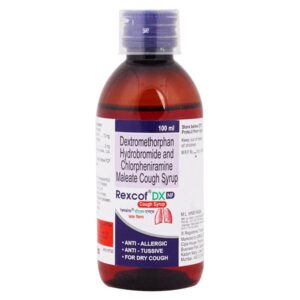CHLORPHENIRAMINE + DEXTROMETHORPHAN + ANTI-ALLERGIC
Chlorpheniramine: Chlorpheniramine is an antihistamine medication that is commonly used to relieve symptoms of allergies such as sneezing, itching, watery eyes, and runny nose. It can also be used to treat symptoms of the common cold and hay fever.
The drug works by blocking the action of histamine, a substance in the body that causes allergic symptoms. By inhibiting the effects of histamine, Chlorpheniramine helps to reduce allergy symptoms and provide relief.
Chlorpheniramine is available in various forms including tablets, capsules, liquid, and as an injection. The dosage of Chlorpheniramine can vary depending on the individual’s age, the severity of symptoms, and the form of the medication. It is important to follow the instructions provided by the healthcare professional or as listed on the medication label.
Common side effects of Chlorpheniramine may include drowsiness, dizziness, dry mouth, blurred vision, constipation, and urinary retention. These side effects are generally mild and go away on their own. However, some individuals may experience more serious side effects such as rapid heartbeat, difficulty urinating, confusion, and hallucinations. It is important to seek medical attention if any severe side effects occur.
Chlorpheniramine may interact with other medications such as sedatives, tranquilizers, and certain antidepressants. It is essential to inform the healthcare professional about all other medications, supplements, or herbal products being taken to avoid any potential drug interactions.
Overall, Chlorpheniramine is an effective antihistamine that is commonly used to alleviate symptoms of allergies and hay fever. It should be used as directed and any concerns or questions about its use should be discussed with a healthcare provider.
Dextromethorphan: Dextromethorphan is a medication commonly used as a cough suppressant. It is an ingredient found in many over-the-counter cough and cold products.
The main mechanism of action of dextromethorphan is to inhibit the cough reflex in the brain. It acts on the cough center located in the medulla oblongata, reducing the urge to cough. However, the exact mechanism by which dextromethorphan works is not completely understood.
The recommended dose of dextromethorphan varies depending on the individual’s age and the specific product being used. Generally, for adults and children above 12 years old, the typical dose is 10-30 mg every 4-6 hours as needed, up to a maximum of 120 mg per day. For children 6-11 years old, the usual dose is 5-15 mg every 4-6 hours, up to a maximum of 60 mg per day.
While generally considered safe when used as directed, dextromethorphan can cause some side effects. Common side effects may include drowsiness, dizziness, and upset stomach. It is important to note that dextromethorphan has the potential for abuse and misuse, especially in large doses or when combined with other substances. High doses of dextromethorphan can cause hallucinations, confusion, and impaired judgment. Long-term or excessive use can lead to a condition called “robotripping,” which can be dangerous and even life-threatening.
Furthermore, dextromethorphan can interact with certain medications, such as monoamine oxidase inhibitors (MAOIs), and can cause a serious reaction called serotonin syndrome. It is important to consult a healthcare professional or read the product label for any potential drug interactions or contraindications before taking dextromethorphan.
As with any medication, it is always advisable to follow the recommended dose, use it as directed, and consult a healthcare professional if any concerns or questions arise.
Anti-Allergic: Anti-Allergic is a medication primarily used to treat allergies and allergic reactions. It is also known as an antihistamine or an allergy medication. It works by blocking the effects of histamine, a substance in the body that causes allergy symptoms such as sneezing, itching, runny nose, and watery eyes.
The drug is commonly used to provide relief from symptoms of hay fever (seasonal allergies), allergic rhinitis, hives, and allergic conjunctivitis. It can also be used in the management of allergic reactions to insect bites or stings, as well as various allergic skin conditions.
The initial recommended dose of Anti-Allergic in adults is usually 10 mg, taken orally once a day. However, the recommended dose may vary depending on the specific condition being treated, the severity of symptoms, and individual patient factors. It is important to follow the instructions provided by the healthcare professional or read the product label carefully for proper dosing guidance.
It is worth noting that Anti-Allergic can cause drowsiness, so it is advisable to avoid activities that require mental alertness, such as driving or operating machinery, until you know how the drug affects you. Other common side effects include dry mouth, blurred vision, constipation, and urinary retention. In rare cases, it may cause allergic reactions, difficulty breathing, or a rapid heartbeat, which requires immediate medical attention.
It is crucial to inform the healthcare provider about any other medications, supplements, or medical conditions you have before starting Anti-Allergic. Certain medications or medical conditions may interact with Anti-Allergic, so professional guidance is recommended to ensure its safe and effective use.
Overall, Anti-Allergic is a widely used drug for allergic conditions, providing relief by blocking the effects of histamine. However, like any medication, it should be used with caution, following the recommended dose and being aware of possible side effects.

